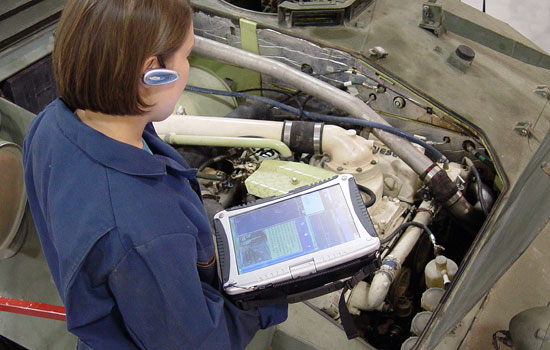$2 million in federal funds helps CIMS sustain military fleets
Submitted photograph
An RIT co-op student conducts research on a military vehicle as part of CIMS’ Defense Modernization and Sustainment Initiative.
RIT’s Center for Integrated Manufacturing Studies will continue to advance research and development in the areas of defense modernization, remanufacturing and asset health management thanks to $2 million in new federal funding recently secured by U.S. Sens. Charles Schumer and Hillary Clinton, as well as Congressmen Randy Kuhl and Tom Reynolds. The funds will advance the efforts of CIMS’ Defense Modernization and Sustainment Initiative, which is assisting the U.S. military in modernizing their vehicle fleets while also improving durability and fuel efficiency.
“This research program in defense modernization and sustainment at CIMS is a national resource that is contributing to the safety and well being of our armed forces, and also saving dollars for the taxpayer by extending the life and improving the performance of critical military equipment,” says RIT President Bill Destler. “It is this type of work that is enabling us to launch the new Golisano Institute for Sustainability with such a strong base of expertise, and we appreciate the longstanding and committed support for this program in our House and Senate delegations.”
“This is terrific news for RIT and will help catapult the Rochester area into the forefront of our defense efforts,” adds Schumer. “These funds will go a long way in supporting the cutting-edge research at CIMS, which seeks to provide our troops with the safest, most durable and advanced vehicle fleets in the world.”
“This is great news for RIT and the entire Rochester Region,” says Clinton. “The work done by CIMS will allow our military to advance the modernization and readiness of their equipment and technology, while we continue to build on the region’s reputation as a leader in cutting-edge research and development.”
“CIMS’ research will help ensure that our troops stay safe by making sure that we continue to develop and test the systems and machinery necessary to accomplish our military goals while also protecting our troops in the field,” notes Kuhl.
“As our brave men and women of the military continue to face new challenges in the battlefield, our responsibility is to provide them with the resources that will protect them and allow them to do their job,” adds Reynolds. “It is great that a local institution, RIT, is taking such an active role in ensuring the safety of our troops. It is great news for our region in terms of potential jobs, and great for our troops in terms of their safety.”
The project, in collaboration with the Army Research Laboratory, seeks to develop processes and tools to track the status and future health of vehicle systems. The initiative also works with military researchers and maintenance personnel to detect, diagnose and repair material aging failures, provide decision support tools to determine when and how to upgrade these systems, and conduct research to develop the next generation of weapons and support systems. The work builds on previous modernization efforts conducted with the Army and the Office of Naval Research.
“We have developed a strong partnership with the Department of Defense and have assisted them in numerous research projects designed to reduce costs associated with sustainment of equipment, enhance design and reuse and ensure the safety of our troops,” states Nabil Nasr, assistant provost for academic affairs and director of both CIMS and the Golisano Institute for Sustainability.”










